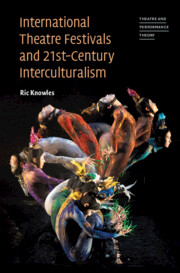Book contents
- International Theatre Festivals and 21st-Century Interculturalism
- Theatre and Performance Theory
- International Theatre Festivals and 21st-Century Interculturalism
- Copyright page
- Dedication
- Contents
- Preface
- Illustrations
- Acknowledgements
- Introduction
- Chapter 1 Indigeneity, Festivals, and Indigenous Festivals
- Chapter 2 Destination Festivals and the International Festival Circuit
- Chapter 3 The Curated Live-Arts Festival
- Chapter 4 Fringe Festivals and Other Alternatives
- Chapter 5 The Intracultural Transnational
- Conclusion
- Notes
- Work Cited
- Index
Chapter 5 - The Intracultural Transnational
Published online by Cambridge University Press: 11 January 2022
- International Theatre Festivals and 21st-Century Interculturalism
- Theatre and Performance Theory
- International Theatre Festivals and 21st-Century Interculturalism
- Copyright page
- Dedication
- Contents
- Preface
- Illustrations
- Acknowledgements
- Introduction
- Chapter 1 Indigeneity, Festivals, and Indigenous Festivals
- Chapter 2 Destination Festivals and the International Festival Circuit
- Chapter 3 The Curated Live-Arts Festival
- Chapter 4 Fringe Festivals and Other Alternatives
- Chapter 5 The Intracultural Transnational
- Conclusion
- Notes
- Work Cited
- Index
Summary
Chapter 5 focuses on a phenomenon I have called 'The Intracultural Transnational'. It concerns itself with a type of festival that brings together an identifiable cultural, regional, or linguistic community across continental, hemispheric, or international borders. These festivals represent an emerging decolonial paradigm that has much in common with the one I have identified as developing from an Indigenous tradition, with festivals serving as sites at which generative debates internal to their specific communities can cross latter-day, enforced borders and forge transnational solidarities while acknowledging, celebrating, or mediating intracultural and historical differences. These festivals of intracultural encounter, however vexed, might serve as alternative models of the kinds of negotiation and exchange across difference that this book sets out to track down. They work to bring audiences together across their differences, most often to address historical divisions brought about by colonialisms and neocolonialisms of various kinds, to constitute trans- rather than international communities, and to ally with the Indigenous festival paradigm in compatible ways.
Keywords
- Type
- Chapter
- Information
- Publisher: Cambridge University PressPrint publication year: 2021

